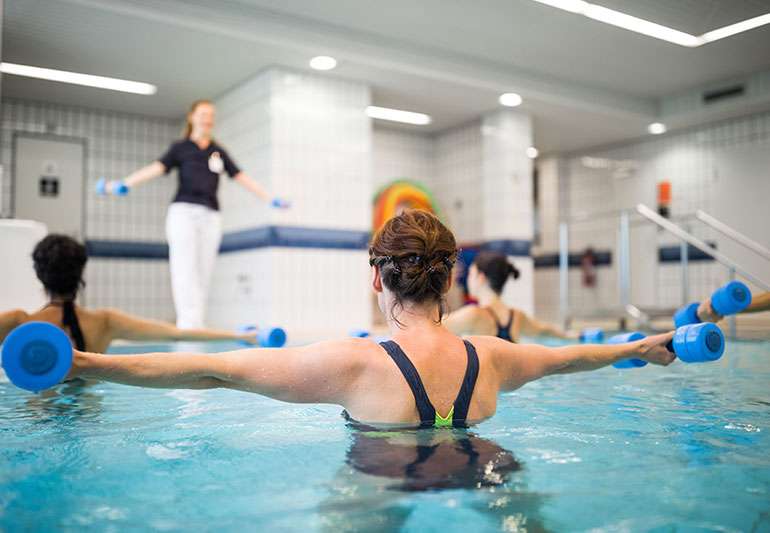What I’m talking about is what is now known as water therapy in some healing circles.
Essentially, it’s drinking large amounts of water immediately after waking up on an empty stomach. This consists of up to 1.5 liters or so of water upon waking.
You should never break a fast with starch or heavy carbohydrates. Liquids are the best way to break a fast, and water in the morning is your best bet to get some great health benefits!
While sleeping, think of your body as being in a state of fasting where it is repairing itself.
An empty stomach allows for more energy to be allocated to the healing and reparation process your body is going through while sleeping. You don’t ever want to compromise these effects by eating heavy meals before bed nor by eating heavy meals upon waking up.
Water Therapy Health Benefits
If you can handle drinking 1.5 liters of water, following water therapy in the morning is good for your body in many ways.
The benefits of drinking water in the morning include:
1. Better Nutrient Absorption and Purifies the Colon
Drinking water on an empty stomach in the morning purifies the colon and allows for better absorption of nutrients in your system.
To fully make use of the nutrients entering the body, you need a fully functioning colon. Drinking water first thing in the morning helps you clean out your colon to help you absorb as many nutrients as you can from the food you eat for the rest of the day.
Add more minerals to your water with Sunwarrior Liquid Light. It contains antioxidants and electrolytes to replenish those you lost overnight.
2. Boosts Metabolism to Help Lose Weight
To help with weight loss, drinking at least 16 oz. of water in the morning can boost your metabolism by up to 24%.
People on a strict diet benefit from drinking at least two full glasses of water before consuming any type of solid food after waking up. That’s because water transports the carbohydrates, protein, vitamins, and minerals you need to the rest of the body daily.
Water helps flush out toxins from your digestive system, helping you absorb more nutrients and in turn, makes you feel fuller faster and longer. This helps minimize hunger pangs and cravings.
3. Hydrates You at a Cellular Level

When you combine the natural properties of water with body movement, you’ve got a winning exercise and physical therapy solution. You may intuitively realize this, but let’s delve into it. Here we take a fascinating look at how and why aquatic therapy and water exercise works so well.
The magic of aquatic therapy starts with its physical properties. Water increases mobility, so pool-based exercise helps people get and stay fit, or regain fitness, without joint damage. Water provides gentle but effective, resistance along with uniform pressure and supportive buoyancy so that individuals gain strength and endurance crucial for overall health.
These characteristics make exercising in water an ideal solution–almost anyone needing physical therapy can benefit from aquatic therapy.
What Is Aquatic Therapy?
Simply put, aquatic therapy involves hands-on therapy techniques and specific body movements designed, taught and supervised by a physical therapist who specializes in aquatic therapy. Your treatment plan is tailored to achieve specific patient needs and goals. We use specially designed exercise equipment, along with simpler exercise aids like balls, and we train you in specific exercise movements.
Whether you’re recovering from an injury or illness and need water rehab services, or you’re looking to improve overall fitness and sports performance, aquatic therapy can be ideal. Water provides natural buoyancy to reduce gravity’s effects and avoid joint strain, yet water is hundreds of times more resistive than air, so water-based exercise provides extremely efficient and effective results. Exercise in a warm water aquatic environment also provides social interaction, but exercise can also be done solo in your own pool. Our expert physical therapists teach you, support you and help you improve your quality of life.
Who Benefits from Aquatic Physical Therapy?
Aquatic therapy can benefit both the mind and body. Spending time in our therapeutic, temperature controlled, pool alongside your physical therapist can alleviate many chronic conditions. Exercising in our 96,000-gallon, indoor pool helps you recover from a variety of injuries and ailments and banish life-limiting symptoms, including:
- Chronic pain, including back pain, joint pain
- Traumatic brain injury patients
- Car accident injuries
- Sports injury
- Muscle spasms
- Circulation problems
- Heart disease
- Stroke recovery
- Neurological injury
- Diabetic Peripheral Neuropathy
- Arthritis (osteo or rheumatoid)
- Balance problems due to muscle weakness on one side
Why Choose Water Therapy?
Our physical therapists may recommend aquatic exercise for you because it is:
- Flexible exercise option, no equipment is required
- No sweating required to gain strength, fitness and pain relief benefits
- Water supports the body while providing gentle resistance
- Warm water soothes sore muscles
- Typically appropriate for all levels of fitness
- Offers stress reduction along with muscle relaxation
- Feels great, especially in our dry southwestern climate
- Provides social interaction or meditative time alone, as you wish
- Avoids joint strain
- Works for all ages, from childhood through senior years
- Helps us to help you achieve the dozen aquatic health, fitness and rehab/recovery benefits listed above–and even more
Aquatic Therapy Experts in Phoenix
Get expert aquatic physical therapy and rehabilitation planned around your specific needs, right here in Phoenix. If you’re in pain or need rehab services to gain strength and mobility, you can count on our skilled, attentive and friendly team of licensed providers. Our compassionate and inspiring staff are here to help you achieve your goals for a pain-free, healthy life. Contact STI Physical Therapy and Rehab today.
Water is essential for our everyday life. From drinking it and using it to bathe, water helps us stay healthy and helps treat disease. Hydrotherapy, also known as aquatic therapy or water therapy, is the practice of using water as therapy. There are many ways hydrotherapy can be used — and both hot and cold water offer different benefits.
Advertising Policy
Cleveland Clinic is a non-profit academic medical center. Advertising on our site helps support our mission. We do not endorse non-Cleveland Clinic products or services. Policy
Integrative medicine physician Irina Todorov, MD, explains how hydrotherapy works and its benefits.
What is hydrotherapy?
Water has many properties that make it a good form of therapy. Hydrotherapy can treat different diseases and illnesses. It can also be used as a form of relaxation and to support your health.
“Hydrotherapy is using water in different ways to affect the body,” says Dr. Todorov. “It could be through immersion in water — a soaking bath or steam bath.”
Part of the beauty of hydrotherapy is that it can involve any form of water, like ice, liquid or steam. Plus, it can carry heat and energy and dissolve other substances like minerals and salts.
Types of hydrotherapy
Whether it’s using a cold compress on a sprained ankle or taking part in a group water aerobics class, there are many different forms of hydrotherapy. Here are a few of the most common:
- Aquatic exercise. Water aerobics, lap swimming and group exercise classes all fall under aquatic exercise.
- Aquatic physical therapy. Performed by a licensed physical therapist, this type of therapy includes a specialized program for each person.
- Warm water baths. Taking a warm water bath can increase blood flow and it can also reduce pain and inflammation.
- Sitz bath. A good option for those dealing with hemorrhoids, an anal fissure or healing from an episiotomy, sitting in warm water for about 15 minutes can relieve pain.
- Saunas. In a small room with wood interiors, water is typically poured onto heated stones or used in other ways to create steam. A recent study shows that using a sauna can help relax individuals, improve mental health and sleep.
- Immersion therapies. A recent study shows that cold water immersion like an ice water bath and contrast water therapy (a series of brief immersions in warm and cold temperatures) can improve the short-term feeling of relaxation in athletes, which can after their performance and well-being.
The benefits of hydrotherapy
Hydrotherapy can be used to treat a variety of conditions. Studies show that aquatic exercise is more beneficial and efficient than land exercises for those who have obesity. Using aquatic exercise can help burn more calories with less fatigue.
“Obesity usually comes with joint pain,” says Dr. Todorov. “Aquatic exercises are a good option because there’s no gravity and individuals can do exercise much longer with less joint pain.”
Here are other conditions and illnesses that hydrotherapy can help treat:
Cold versus warm water
Should you use cold water or warm water? You’ve probably used one or the other to treat injuries or ailments.
“When you have an injury like a sprain, it is recommended to use a cold compress because it causes the arteries to constrict and can decrease pain,” says Dr. Todorov. “But if we want something to heal like chronic back pain, you want a warm immersion because it causes muscle relaxation and can improve healing.”
Cold water benefits include:
- Decreases pain.
- Reduces inflammation.
- Lessens soreness in muscles.
- Lowers body temperature.
- Boosts your immune system.
Warm water benefits include:
- Decreases pain.
- Promotes blood flow.
- Relaxes muscles.
- Flushes out toxins.
- Relieves constipation.
Is hydrotherapy right for you?
There’s a lot of reasons to try out a form of hydrotherapy. It can improve your range of motion, help with depression and anxiety and even provide some great social benefits if you’re participating in a group or class.
If you don’t have access to a pool or sauna, even just taking a bath can have its perks, says Dr. Todorov.
“Sitting in a bath with some aromatherapy like chamomile or lavender for relaxation can be a great form of self-care,” she says.



